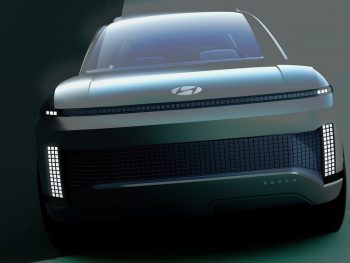Hyundai to launch 17 new electric vehicles by 2030
Hyundai Motor has revealed plans to launch 17 new battery electric vehicles (BEVs) by 2030 based on a second-gen EV platform, under its new Electrification Strategy.

The arrival of the new models follows the launch of the Hyundai Ioniq 6 next year, followed by Ioniq 7 in 2024
Revealed at its 2022 CEO Investor Day forum, the plans see the carmaker target annual sales of 1.87 million BEVs annually by 2030, giving it a 7% share of the global market and supported by a wider model line-up, optimised manufacturing capacity, and increased hardware and software competitiveness.
Of the 17 new BEV models due by 2030, 11 will launch under as Hyundai models, along with six models under the Genesis luxury brand.
The Hyundai BEV models will include three saloons, six SUVs, one light commercial vehicle as well as one new type model. For Genesis, the BEV line-up comprises two passenger cars and four SUVs, including the electrified GV70 launching this year. Starting in 2025, all newly launched models from Genesis will be electrified.
The arrival of the new models follows the launch of the Ioniq 6 next year, followed by Ioniq 7 in 2024.
Hyundai will also introduce a new ‘Integrated Modular Architecture’ (IMA) platform for its EVs, evolved from the existing electric global modular platform (E-GMP) that underpins the Ioniq 5 and GV60 models launched last year.
The new architecture, which will also serve as its exclusive purpose-built vehicle (PBV) platform, standardises the battery system and motor to help reduce manufacturing costs and charging times while increasing range. It can also be used for BEV models in all segments.
As part of its EV roadmap, the brand is also looking to boost its BEV production capability, centered on high-demand regions, and is considering adding a new dedicated BEV production facility. This would run alongside its existing BEV production facilities in Korea and the Czech Republic. Its new Indonesian plant has also recently started operation, and will start BEV production this year to grow volumes further.
Alongside increased BEV production bases, Hyundai is trying to increase the local procurement rate of batteries through strategic alliances with battery companies in major regions, including the US, to secure sufficient battery supply. Through these alliances, the company expects to obtain more than 50% of its next-generation lithium batteries for BEVs starting in 2025.
In addition, Hyundai will also diversify battery sourcing and is also exploring next-generation technologies, such as solid-state batteries, in cooperation with various global partners.
Under the third prong of its roadmap, Hyundai is looking to strengthen competitiveness in BEVs through hardware and software capabilities, becoming a mobility solutions provider. This will benefit drivers through additional services and technologies. The company plans to apply an over-the-air (OTA) update to new models that will be launched starting at the end of 2022, and expand it to all Hyundai models by 2025.
It’s also advancing its autonomous driving technology. The Highway Driving Pilot (HDP), a Level 3 autonomous driving function, will be applied to Genesis G90 starting in the second half of this year. Meanwhile, Hyundai’s ‘Motional’ autonomous driving joint venture with Aptiv is also planning to expand the service area of its Ioniq 5-based robotaxi following its commercial service launch in 2023 and start self-driving delivery services this year.
President and CEO Jaehoon Chang said: “Hyundai is successfully accelerating its transition to electrification and becoming a global leader in EVs despite a challenging business environment caused by the global chip shortage and ongoing pandemic.
“Along with our seamless efforts to improve EV value, Hyundai Motor will continue to secure its business sustainability as a ‘Mobility Solutions Provider’ through advanced technologies of not only hardware but also software.”












